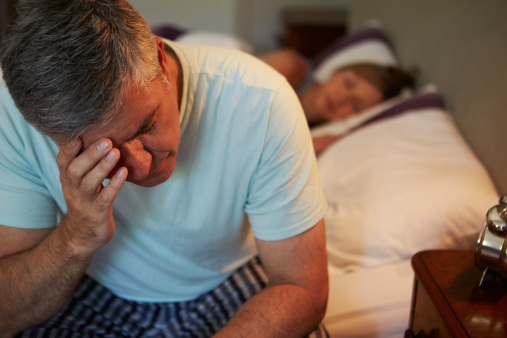 Do you find that you are constantly tired throughout the day—even after getting what seems like a solid seven to eight hours of sleep throughout the night ?
Do you find that you are constantly tired throughout the day—even after getting what seems like a solid seven to eight hours of sleep throughout the night ?
And it’s likely that those few hours you are awake involve a perpetual struggle against headaches, sluggishness, and confusion!
Well, I’m here to tell you about a hidden health problem that could be causing all these issues.
Sleep apnea is a common problem affecting as many as 53% of men and 26% of women. It’s the inability to breathe properly during sleep—and since it often goes undiagnosed and untreated, the fact is, you might not even be aware you have it.Because sleep apnea makes it very difficult to get a good night’s sleep and its symptoms can easily go unnoticed, it can create some pretty severe health problems. Sleep apnea sufferers have an increased risk of heart attack, memory troubles, and the early onset of dementia.People with sleep apnea are almost always in and out of consciousness during sleep, and although they may appear to be sleeping, they might awake frequently from oxygen deprivation—without even realizing they’ve awoken. Snoring often accompanies sleep apnea, as does gasping for air.When your brain doesn’t get enough oxygen, it can lead to cognitive decline. A study published in the journal Neurology indicated that people with sleep apnea were diagnosed with mild cognitive impairment more than a decade earlier than those who didn’t suffer from sleep apnea! People with sleep apnea typically saw their memory slip around the age of 77, while those without it didn’t experience decline until they were about 90 years old.
Not only can sleep apnea impact your memory by cutting oxygen to the brain, but the constant waking (even if you’re unaware of it) can prevent your glymphatic system from doing its job. This is essentially a cleaning crew that removes toxic waste from the brain and files memories, but it can only take place during sleep.
The best way to learn if you have sleep apnea is to go to a sleep clinic to be monitored. If you’re tired and you don’t know why, it might be a sign. If there’s evidence you toss and turn throughout the night, or if you wake up with heart palpitations or feelings of distress—like you’re choking—it could be a sign. Finally, ask your partner if you snore; heavy snoring could be a sign of sleep apnea.
Sleep apnea could be caused by lifestyle decisions like diet and weight, so perhaps try cleaning up your diet, dropping a few pounds, and cutting back on alcohol. If that doesn’t work, you could also try acupuncture. Although the jury is still out on whether or not it is a proven effective treatment, acupuncture has shown some promise in sleep apnea treatment. It’s an extremely low-risk therapy, so it’s worth a try if you suffer from sleep apnea.
To get the most positive results, you can combine these lifestyle changes and acupuncture treatment with the use of a continuous positive airway pressure (CPAP) machine—people who use this don’t typically experience the same early onset of cognitive problems. A CPAP machine helps open your airways while you breathe, ensuring you have a safe night’s sleep. It can be a bit of an adjustment getting used to it, but it is well worth the initial difficulties.
Sources for Today’s Article:
Carroll, L., “Sleep Apnea May Speed Memory Loss, Alzheimer’s Onset: Study,” NBC News, April 16, 2015; http://www.nbcnews.com/health/health-news/sleep-apnea-linked-earlier-memory-loss-study-n342931, last accessed May 13; 2015.
Osorio, R., et al., “Sleep-disordered breathing advances cognitive decline in the elderly,” Neurology web site, April 15, 2015; http://www.neurology.org/content/early/2015/04/15/WNL.0000000000001566, last accessed May 13, 2015.
American Sleep Apnea Association, “Acupuncture May Ease some OSA,” American Sleep Apnea Association web site, 2010; http://www.sleepapnea.org/treat/treatment-options/acupuncture.html, last accessed May 20, 2015.
